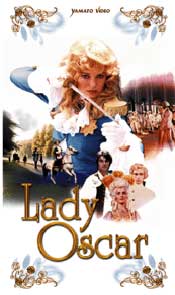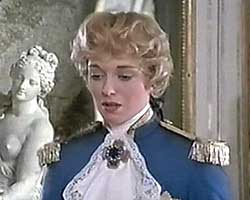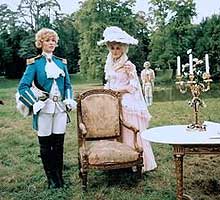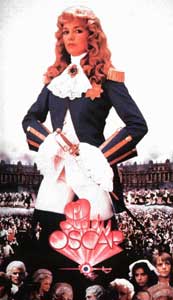 Set in 1775, Jacques Demy directs Lady Oscar (Berusaiyu no bara, 1978). It is a tale of a swashbuckling adolescent woman of the French Revolution, filmed partially in France but with Japanese funding & for a Japanese audience. Set in 1775, Jacques Demy directs Lady Oscar (Berusaiyu no bara, 1978). It is a tale of a swashbuckling adolescent woman of the French Revolution, filmed partially in France but with Japanese funding & for a Japanese audience.
It's adapted from the shojo manga (girls' comic book) series Rose of Versaille (Berusaiyu no bara, 82 weekly issues, 1972-1973) by Riyoko Ikeda. Although in the United States the comic book industry has been male-dominated with women illustrators relegated to fill-in colorists without named credits, in Japan the rise of girls' comics early in the 20th Century left the form wide open for women as comic book writers & illustrators.
The story was soon a musical stage adaptation performed by an all-female cast by the world-famed ultra-kitschy Takarazuka Review.
The musical was first launched in 1974 & became the standard production for the next two years, then was revived for the 1988-1989 seasons, & again in 1991 & 2001. It remains "the" story most strongly associated with the Takarazuka troupe, although since the troupe's 1914 founding in the Meiji era, they've done much else both before & since.
Many a teenage girl's first major crushes throughout Japan were on women who specialized in the male romantic leads. Even wealthy dowagers linger at the stage doors & attempt to court the "boys" of the Takarazuka Review, but these beautiful young actresses are sworn to chastity, & if they take lovers or decide to marry, they must give up their stage careers.
 Catriona MacColl plays the spunky cross-dressing Oscar Francoise de Jarjaye, personal bodyguard to Marie Antoinette (Christine Bohm). Lady Oscar is in love with a youth (Barry Stokes) who was her childhood playmate, but he sees only the "male" side of his best friend & takes a long time to realize Lady Oscar is a beautiful buxom gal despite her soldier's uniform & expert swordplay. Catriona MacColl plays the spunky cross-dressing Oscar Francoise de Jarjaye, personal bodyguard to Marie Antoinette (Christine Bohm). Lady Oscar is in love with a youth (Barry Stokes) who was her childhood playmate, but he sees only the "male" side of his best friend & takes a long time to realize Lady Oscar is a beautiful buxom gal despite her soldier's uniform & expert swordplay.
Now in the manga series, male & female figures are drawn as feminine, & of course in the Takarazuka Review, men, women, & the cross-gendered Oscar, are all women. There's also a whimsical charm to Japanese women playing Caucasian characters, Oscar herself traditionally wearing a blonde wig that makes her much more like a Farah Fawcett in Charlie's Angels than a soldier of France.
The charm of all this affectation is totally lost in giving the film a gender-correct & "properly" white cast & placing them in "proper" French location sets, where they continue to wear the unrealistic stage costumes, & most peculiarly of all, speak English.
Catriona MacColl probably can't act at all, but certainly doesn't do so in this goofy film, which deletes all the wrong parts of the story so that even as a piece of kitsch it makes no earthly sense.
Catriona is perhaps best remembered for her role as Lucy Boyle in Lucio Fulci's trash classic The House by the Cemetery (Quella villa accanto al cimitero, 1978), giallo horror which likewise did not require an ability to act. As Lady Oscar she looks more retarded than swashbuckling swinging from the chandelier or duelling with foil.
 Thus, a French director filming in France but in English for the Japanese theater-going public.
Thus, a French director filming in France but in English for the Japanese theater-going public.
I can't for the life of me figure out why Jacques Demy would want anything to do with such a ridiculous project, unless he was desperate for work, which is quite possible, as his career nearly tanked in the 1970s. But having accepted the dumb project, why not make more of it than this?
Nor is it at all comprehensible what the Japanese producer Matachiro Yamamoto & Toho Studios thought they were doing not getting someone Japanese to adhere to the manga &/or Takahara Review content & traditions.
A Japanese cast playing French characters in Japanese language would've been much more thrilling for such an intentionally hyper-romantic kitsch story.
Removing the odder aspects of the story & its traditional manner of being told did not turn it magically into an authentic historical, but robbed it of its spirit. And with what was mistakenly filmed, the sole interest is in conveying just how awful & misguided cinema is capable of being.
copyright © by Paghat the Ratgirl
|

